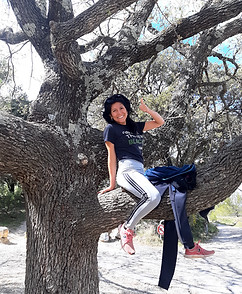
Jacqueline M. Valverde-VIllegas
HOW DID I HAPPEN TO BECOME A HUMAN IMMUNOGENETICIST?
In the last two years as an undergraduate student, I was doing my internship in the Faculty of Veterinary at UNMSM in Peru. I remember this period of my life as an exhilarating journey as an undergraduate student. In the lab of Molecular Biology and Genetics led by Dr Lenin Maturrano, there was a project to understand why a group of South American Camelids succumb to enterotoxemia and are affected severely while another remains resistant to infection or has a mild disease. Host genetic factors of the immune system were proposed, and since then, I experienced a kind of enthusiasm and eagerness to become a scientist in this field. I also learned alongside veterinarians, pharmacologists and clinicians about bacterial cell culture, diagnosis and pathogenesis of enterotoxemia or pneumonia.
In low-income countries like Peru, it is challenging to be a full-time scientist. And when I completed the University, I needed to find a paid job. As a research assistant, I worked on sustainability and biodiversity projects where I also acquired administrative and lab management skills. While working, I was searching for scholarships abroad to pursue my postgraduate studies in the genetics and immunology field. I found the Immunogenetics and Immunobiology laboratory in Brazil, led by Dr. José Artur Bogo Chies, where I spent almost seven years and grew up as a scientist.
Thanks to my mentors, Dr. Lenin Maturrano and Dr. José Artur Bogo Chies, I enjoy my scientific journey, and I am willing to continue discovering the genetic basis of this immuno-logic world.



O sistema imuno-logico, from Alessandra Peres, José Artur Bogo Chies et al. A short but great book to start to discover the immuno-logic system.

Humanos, from Lluís Quintana-Murci. A great book if you are interested in human evolution.
Une histoire génétique: notre diversité, notre évolution, notre adaptation, from Lluís Quintana-Murci. Yes, I am super fan of Lluís, visionary and amazing scientist who enriched my understanding of the immunogenetics in an integral way.
WHAT DO I DO BESIDES BEING A SCIENTIST?
In my spare time I love to explore new places or return to my favourite ones. I enjoy travelling and exploring the cities/towns with local people to exchange our cultures and views about life. As a Peruvian, I like to explore the different culinary flavours, and because I love biodiversity, I try to learn more about that from my trips; the botanical gardens are one of the first places to visit.

The botanical garden in Morocco.
Watercolor lover
I fell in love with this art since not to long ago and now is part of my life. I realised that the fact of painting with the natural fluxes of the water going in different directions and, without looking for perfectionism or controlling all details, makes me feel free and more creative. Watercolor painting is giving me lessons that I can translate into my real life.
Languages lover

One of my achievements, outdoor painting.
The last 15 years of my life I have lived in three different countries. Seven years in Brazil and almost seven years in France, and I'm currently based in England (for maybe another seven years? let's see). I speak four languages. Portuguese, French, Spanish and English. I love when I transform myself each time when I switch from one language to another. I have a different personality for each one, my body language and interactions with people, change. The beauty of speaking different languages is that you can have authentic connections with people and mimicking in their culture. My life have another taste when listening music, dance or reading books in those different languages. There is still work in progress with my English and communication with native english speakers, wait, I will arrive... :)